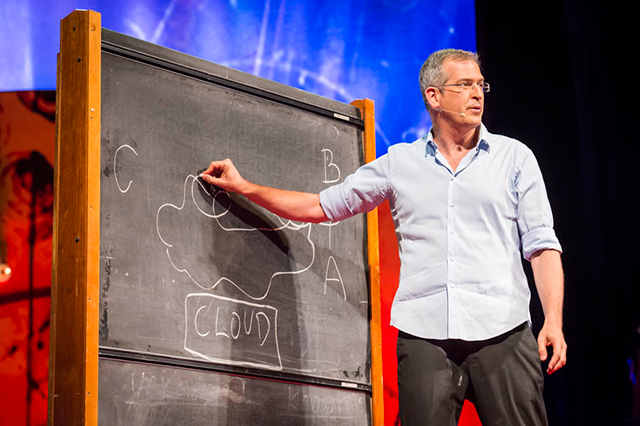
Uri Alon, by James Duncan Davidson, courtesy of ted.com
The myth of the lone genius generating revolutionary ideas is losing its power over our imaginations. How do we move from being stuck to making breakthrough discoveries? Weizmann’s Uri Alon has a novel idea: improvisation.
Two seems to be the magic number when it comes to creativity, with new focus being applied to how pairs like John Lennon and Paul McCartney work off each other to drive their collective creativity to new heights. As half of a creative pair myself, I understand how this works. It’s a daily process, one that requires vulnerability, imagination and a big dose of what improv people call “Yes And.”
Yes And comes down to less ego and more openness, a huge focus on possibility and never shooting the other person’s concept down, at least in the developmental stage (later, as an idea crystallizes, the process changes). It also requires participants to accept that they have to keep going, meaning that there are no excuses for why you can’t do something. Everybody gets tired, distracted and fed up with reality sometimes, but the goal is to keep working until you find a way to accomplish what you imagine.
One of the best TED talks of all time, given by Weizmann scientist Uri Alon at TEDGlobal in June 2013, is about just that: using Yes And to get to a solution to a real problem. Improv can sometimes feel silly, especially to people who have no experience with the concept. Not only does Alon’s lab use techniques from improvisational theater to further their science, they practice and study improv and its effects on human interaction. The Alan Alda Center for Communicating Science at Stony Brook also uses improv as a tool for breaking through. The idea that scientists should communicate as storytellers, not lecturers, is gathering steam, but the idea that researchers can bring this skill into the lab is still revolutionary.
Improv, playful as it seems on the surface, can be a powerful gateway for breakthroughs. Alon’s lab is focused on recurring structures throughout basic genetic circuits called network motifs. Dynamic proteomics, a system for monitoring the position and amounts of endogenous proteins in individual living human cells, has huge implications for studying drug efficacy in cancer and elsewhere.
Alon’s TED talk is brilliant because it illuminates that scientific research is about a process, not just the results.
"We all study science,” Alon said, “as if it's a series of logical steps we question and answer, but doing research is nothing like that...Improvisation, just like science, goes into the unknown... unlike science, they tell you from day one what's going to happen - you're going to fail miserably. You're going to get stuck, and you practice staying creative inside that stuck place."
Alon’s journey from being stuck to making unexpected discoveries is a memorable one. This video should be shown in every classroom and lab.


